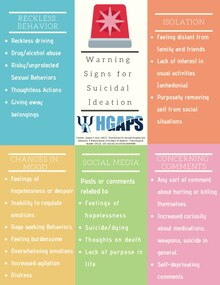Helping Give Away Psychological Science/1789: Dealing With Mental Crisis on a University Campus
|

Mental Health Resources for the Carolina Community/Chapel Hill[edit | edit source]This page contains resources compiled by Helping Give Away Psychological Science (HGAPS) for individuals who are struggling or know someone struggling with suicidal ideation. This page also includes resources for general help and coping outside of crises. In 2021, 51.8% of college students felt lonely, 26% of students had suicidal ideations, and 2.7% attempted suicide.[1]Applied to UNC's undergraduate population[2] of 19,845 students, the numbers would be 10,280 (lonely), 5,157 (suicidal ideation), 536 (attempted), respectively. We want to see these numbers decline and provide resources and help everyone through these difficult times! This page is not a comprehensive list of all resources available, but serves as a starting point for anybody trying to find help.
|
Crisis Response[edit | edit source]This section contains resources for various crisis hotlines and helplines specifically catering to suicide prevention. There are both phone numbers that can be used to call and talk to someone and numbers to text.
|
General Resources[edit | edit source]
 
|
Community Resources[edit | edit source]
|
University of North Carolina - Chapel Hill Campus Resources[edit | edit source]This section contains mental health resources directed towards the UNC-Chapel Hill community. It ranges from resources for counseling services for students to information for faculty.
|
- ↑ National College Health Assessment. (2022, February 10). Fall 2021 - Reference Group Executive Summary. American College Association. Retrieved February 25, 2022, from https://www.acha.org/documents/ncha/NCHA-III_FALL_2021_REFERENCE_GROUP_EXECUTIVE_SUMMARY.pdf
- ↑ "Analytic Reports | OIRA". oira.unc.edu. Retrieved 2022-02-25.